New Directions for the Brazilian Amazon
The Amazon rainforest is spread out over nine national states of the South American continent. As trees bind carbon dioxide (CO2), the Amazon forest plays a crucial role in climate protection measures. Home to 60 percent of the world’s rainforest area, Brazil contains the largest part of this precious ecosystem.
GLOBAL IDEAS asked Brazilian forest activist Pedro Soares to write a guest article for our blog. Pedro stresses that we can only protect the Amazon by providing an adequate income to those living in the forest.
By Pedro Soares
The Brazilian Amazon area covers about 50 percent of Brazil’s territory. That is a total an area of 4,196,943 square kilometers.
The biggest stock of tropical forest in the world has always been seen as a barrier to regional economic development. In fact, deforestation occurs mainly due to an economic rationale: the forest does not provide sufficient income for landowners and forest dwellers, when compared to the income they could obtain for more profitable activities such as logging, agriculture or cattle ranching. But the lack of an economic value for the stand forest is the main caveat towards the promotion of forest conservation policies and programs.
![]() read more
read more
Climate Champion Iranildo at the International TUNZA Conference 2011
The British Council International Climate Champion Iranildo de Sousa Ferreira was selected by the United Nations Environment Programme (UNEP) to represent Brazil at the TUNZA International Children & Youth Conference on the Environment. The conference starts today.
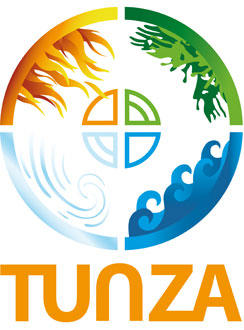 Iranildo de Sousa Ferreira was selected from thousands of applicants from around the world. He will be at the TUNZA International Conference in Indonesia until 01 October .
Iranildo de Sousa Ferreira was selected from thousands of applicants from around the world. He will be at the TUNZA International Conference in Indonesia until 01 October .
Iranildo helped to prepare proposals to be presented in the next United Nations Conference on Sustainable Development – Rio +20, and will evaluate the contribution of youth to the International Year of Forests and share his experiences of activism and his work with experts in the environmental area.
TUNZA will be held by the UNEP in collaboration with the Government of Indonesia. It will bring together 1400 children and youth, to discuss their role and inputs to the upcoming United Nations Conference on Sustainable Development – Rio+20. Under the slogan “Reshaping our future through a Green Economy and Sustainable Lifestyle”, the conference will also review the contribution of youth to the International Year of Forests and how they can adopt more environment-friendly lifestyles. The conference themes are Rio + 20 (Green Economy) / Green Lifestyles, Forests, Sustainable Consumption and State of the Global Environment from the youth perspective.
“This is not a time for pessimism or to turn a blind eye to environmental problems. It is time for constructive and decisive action because the alert signal has been given.” Iranildo says.
After an Amazing Arctic Experience, a résumé
 The inherent value of the Arctic – its genuine and honest nature – provided us with ideas and inspiration to last for a lifetime. The incredible modesty of the Arctic is astonishing. Neither icebergs, polar bears, puffins, rocks, nor any other part of this amazing ecosystem demand something from us. But we demand something from it. We want the fresh air that it gives us, we want to experience its beauty, we want it to stay in its current form. But at the same time most of our every day actions and behaviour demonstrate otherwise. Often they are harmful to the Arctic – harmful to the ecosystems on Earth, upon which life depends. Understanding the linkages, in which we as human beings are embedded, as various networks of ecosystems is an essential first step for changing our impact and to create change towards more sustainable societies and economies. In essence, it means to reconnect to what really matters to us as human beings.
The inherent value of the Arctic – its genuine and honest nature – provided us with ideas and inspiration to last for a lifetime. The incredible modesty of the Arctic is astonishing. Neither icebergs, polar bears, puffins, rocks, nor any other part of this amazing ecosystem demand something from us. But we demand something from it. We want the fresh air that it gives us, we want to experience its beauty, we want it to stay in its current form. But at the same time most of our every day actions and behaviour demonstrate otherwise. Often they are harmful to the Arctic – harmful to the ecosystems on Earth, upon which life depends. Understanding the linkages, in which we as human beings are embedded, as various networks of ecosystems is an essential first step for changing our impact and to create change towards more sustainable societies and economies. In essence, it means to reconnect to what really matters to us as human beings.

During the last week we – 17 young people from 12 different countries – supported by amazing trainers have begun to feel like a community, a strong community bond together by an inspiring and exceptional experience and the common wish to create a sustainable future. We will support each other and work together to reconnect to the environment we work in – on local, national and global scales.
Our actions, diverse in nature, are just waiting to be put into practice in our home countries and beyond. There will be challenges we will all face, but the inspiration of this Arctic experience outweighs them by far.
Maike Buhr
This post is an abridged version of a text taken from the British Council’s Arctic Climate Training blog Click here to learn more about the Arctic Climate Training project
Iranildo de Sousa Ferreira, Climate Champion from Brazil
Iranildo de Sousa Ferreira – International Climate Champions Brazil was a keynote speaker at Environment Week at the University of Fortaleza (UNIFOR) in Fortaleza, Ceará, June 7, 2011. The theme was “Science and Sustainability”. He spoke on the Scientific Basis of Climate Change: Vulnerability, Mitigation and Adaptation. Iranildo kicked off a rich debate about the main consequences of climate change for the state of Ceará and Brazil.
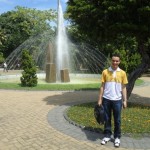 The University of Fortaleza (UNIFOR) held its Environment Week on 6. and 7. June 2011. Here I was invited to speak and debate the science of climate change. In my speech I talked about the scientific basis of climate change, using the final report of the Intergovernmental Panel on Climate Change (4AR-IPCC), the recent report of the 3rd WG-IPCC Energy and Climate Change Mitigation and the human contribution to climate change, to show the vulnerabilities, mitigation and adaptation of climate change. I also used the IPCC data and documents of the United Nations Framework Convention on Climate Change – UNFCCC, as well as the advances of the last negotiations at COP 16.
The University of Fortaleza (UNIFOR) held its Environment Week on 6. and 7. June 2011. Here I was invited to speak and debate the science of climate change. In my speech I talked about the scientific basis of climate change, using the final report of the Intergovernmental Panel on Climate Change (4AR-IPCC), the recent report of the 3rd WG-IPCC Energy and Climate Change Mitigation and the human contribution to climate change, to show the vulnerabilities, mitigation and adaptation of climate change. I also used the IPCC data and documents of the United Nations Framework Convention on Climate Change – UNFCCC, as well as the advances of the last negotiations at COP 16.
My speech ended in a debate about the main consequences of climate change in the state of Ceará in Brazil. Based on the scientific data that I used, there will be several consequences for the State of Ceará, especially the increase of extreme events like rising sea level and dryness.

Iranildo conducting discussion with the audience of the Week Environment of the University of Fortaleza - UNIFOR.
Regarding to Brazil, I mentioned that the consequences of rising temperatures will be worse for the North and Northeast of the country, a region that is called one of the hotspots of climate change. It may suffer from drought and decline in its biodiversity, water availability and the increase of extreme events. I also talked about the likely increase in rainfall in Southern Brazil and launching the kit of the UN Decade for Sustainable Development of the Ministry of Environment of the UNESCO Office in Brazil.
When you ask me about what it takes to reduce the effects of Climate Change, I would say that the first thing we should do is to change attitudes towards the issue and get involved in this process that concerns us all. The first tool is environmental education, because we are building our environmental citizenship.
The Environmental Week at UNIFOR was a remarkable moment for me, because after I brought the universities to discuss the issue of climate change, I am now invited by universities to explain and discuss the topic and that is all due to the opportunity to be an International Climate Champion.
Iranildo de Sousa Ferreira, Climate Champion from Brazil
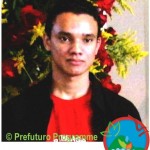 Iranildo de Sousa Ferreira is a 16 year old student who has been working in the environmental area for several years. He is a student and lives in the city of Ibiapina, Ceará in Brazil. Protecting the environment is his passion. Iranildo is writing for the GLOBAL IDEAS Blog about his experience with climate change and about projects he’s working on.
Iranildo de Sousa Ferreira is a 16 year old student who has been working in the environmental area for several years. He is a student and lives in the city of Ibiapina, Ceará in Brazil. Protecting the environment is his passion. Iranildo is writing for the GLOBAL IDEAS Blog about his experience with climate change and about projects he’s working on.
The Brazilian Climate Champions have been at the “Ceara’s 1st Night Cultural Fraternity Campaign”, 27th of May 2011. The event took place in the town of Ibiapina, the main theme was “fraternity and Life on Earth.”
I started a debate about environmental and ecological issues, that involved teachers, students, the government and the society in the city of Ibiapina-Ceará.
This years “Brotherhood Campaign” to me is an invitation to reflect all the needs to carry out actions that aim at mitigation and the adaptation of climate change. It involves the constructive actions of the brazilian population to create a sustainable society. It also set the focus on the problems caused by years of misuse of natural resources and pollution solutions.
My lecture as a Climate Champion was entitled “Climate Change – Think + Act (think globally and act locally).” I stated that the new Brazilian Forest Code (adopted by the Board of Deputies of Brazil) could exacerbate climate change. According to the increased pressure on forests, that will undermine the international commitments, that had been assumed by Brazil in 2009 at COP 15 in Copenhagen.
I also explained the Fraternity Campaigns motto “Creation groans in travail”, that i use to decribe the changes and phenomena caused by the harmful action of the people, causing pain and suffering to humanity. The event was the initiative of the Municipal Government and the Catholic Church Ibiapina, receiving support from the Department of Environmental Conservation Program Prefuturo. It reflects the urgency of individual and collective attitudes in favor of changes in the relations between man and the environment.



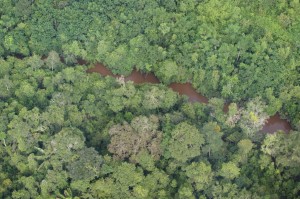

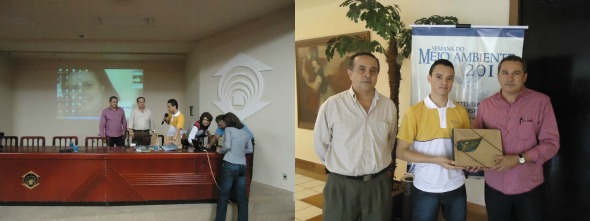




Feedback